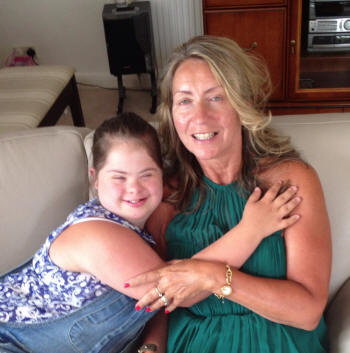Catholic Medical Quarterly Volume 64(1) February 2014
Practical medical ethics
Down Syndrome:
Blessings and Eugenics
By Lynn Murray
 In
March 2000, I gave birth to a baby girl, who, we were told, had
Trisomy 21, Down Syndrome. A blood test had to be carried out
but the Professor was pretty sure of his diagnosis. I remember
thinking that he might have been a bit more upbeat, but other
than that I couldn’t fault his textbook delivery of the news. He
had told both parents as soon as possible in a private room and
never gave us any of his own take on things; he just said that
the news might be a shock to us. So, thankfully, we had the best
start we could have had under the circumstances. I wanted my
baby, but I knew that I didn’t want Down Syndrome, even though I
really knew little about it.
In
March 2000, I gave birth to a baby girl, who, we were told, had
Trisomy 21, Down Syndrome. A blood test had to be carried out
but the Professor was pretty sure of his diagnosis. I remember
thinking that he might have been a bit more upbeat, but other
than that I couldn’t fault his textbook delivery of the news. He
had told both parents as soon as possible in a private room and
never gave us any of his own take on things; he just said that
the news might be a shock to us. So, thankfully, we had the best
start we could have had under the circumstances. I wanted my
baby, but I knew that I didn’t want Down Syndrome, even though I
really knew little about it.
A midwife had asked me during my pregnancy if I would be having any of the prenatal tests, when I said no, she said ‘Is that because you wouldn’t do anything?’ I was disappointed that she didn’t suggest that the tests could merely be informative and this conversation affirmed my previous fears about antenatal testing. Termination was definitely on the agenda and our baby would have been the subject of scrutiny.
But, thankfully, we had our baby, and we love her like our other children, but we get frustrated by the attitude of some professionals who don’t seem to understand why we don’t just accept our lot, why we fight for better health for her. I read famous parents’ birth stories with medical staff discriminating against their vulnerable babies with Down Syndrome. I’ve filed those newspaper articles away and kept all Rachel’s medical letters, I feel I’m gathering evidence for a case which doesn’t even exist.
Screening for Downs and
the so-called “benefit” of
abortion
In 2002 someone gave me a copy of a Health Bulletin extolling the virtues of Down Syndrome screening which concludes with the statement that “the rising termination rate in younger women suggests that the benefits of antenatal screening, insofar as births are avoided, are now extending to the lower risk age groups who contribute the majority of DS cases.”
“the rising termination rate in younger women suggests that the benefits of antenatal screening, insofar as births are avoided, are now extending to the lower risk age groups who contribute the majority of DS cases.”
Later, another friend sent me details of a 2003 study by the Clinical Chemistry Dept., Queen’s College, Staffordshire warning that screening for Down Syndrome raises ethical concerns about genetic testing in general that need to be dealt with before the introduction of any prenatal screening test. Recently, I discovered a 2004 Scottish Health Technology Assessment online which declares ’It has been hypothesised that when the State (and therefore by extension the NHS) funds a screening programme that selects for foetal anomalies there is a risk that this may be viewed as eugenics, or that the social acceptance of people with disabilities is diminished leading to substandard health care of affected children.’ However despite damning evidence, Scottish women are now being offered a costly new screening test for Down Syndrome, designed to increase the uptake of antenatal screening which has previously been in decline. All the evidence suggests that screening for foetal abnormalities with fast path to abortion may not actually be for the benefit of women, but may have a more eugenic purpose. But unless there is a positive cultural change then Governments will continue to spend millions in pursuit of the perfect antenatal screening test and each pregnancy will be infected with fear. We can also assume that this will mean a continued lack of research into these conditions.
Our beautiful daughter
Despite all this, our 12 year-old daughter Rachel is a happy, engaging young person who has attended mainstream school and mainstream activities. Mainstream children are growing up with children like her and perhaps their view of disability will be more positive than my generation, leading to more enlightened policies and practices in future.
Rachel is a happy, engaging young person who has attended mainstream school and mainstream activities.
 Professor
Lejeune, who discovered the cause of Down Syndrome and whose
cause for canonization is now being investigated summed up the
significance of Down Syndrome. One day he said to his wife
‘I could spend years discovering the cause of many genetic
illnesses, and I could keep on studying many rarer diseases. But
I am convinced that everything is interrelated. If I find out
how to cure Trisomy 21, then that would clear the way for curing
all other diseases that have a genetic origin.’
Professor
Lejeune, who discovered the cause of Down Syndrome and whose
cause for canonization is now being investigated summed up the
significance of Down Syndrome. One day he said to his wife
‘I could spend years discovering the cause of many genetic
illnesses, and I could keep on studying many rarer diseases. But
I am convinced that everything is interrelated. If I find out
how to cure Trisomy 21, then that would clear the way for curing
all other diseases that have a genetic origin.’
Related reading
Readers may also be interested to read:-
- Treloar J. 1998 The Cradle of the Womb. Take care who peeps in. Catholic Medical Quarterly Vol 49 (August 1998)
- Refusal form for antenatal tests. CMA (2000)
